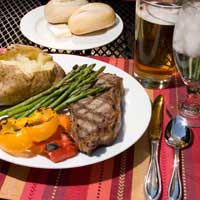How Easy is it to Completely Avoid E Numbers?

If you've read the information about E numbers and don't fancy consuming products that they're contained in, then how easy is to completely avoid them?
Various forms of E numbers are used in a multitude of products these days. There are colourings added to foods and drinks to make them look more appealing, preservatives enable foods to have a longer shelf life and thickeners help bulk up foods and improve their look and consistency. All the E numbers play a role in the processed and manufactured food as we know it today.
However, despite their wide abundance, if you really don't fancy consuming lots of E numbers, then there are ways of avoiding them. Perhaps your child is showing signs of hyperactivity after drinking colour-filled squashes or fizzy drinks, or maybe you're just concerned about the health implications of E numbers. Whatever your thoughts or reasoning, if you're buying foods from supermarkets or other shops yourself, then you can have a degree of control over what you choose to purchase and consume.
Learning to Read the Labels
As a starting point, anyone wanting to avoid E numbers needs to become an expert at reading food labels. The ingredients list on packaging gives a good insight into exactly what is contained in foods and drinks. You do need to be aware that some manufacturers prefer to list the chemical names in full, rather than the shortened E numbers, so even though it may not look at first glance that there's any E numbers in something, there may actually be plenty.
One way of getting around this would be to print out the lists of E numbers (e.g. the lists provided on this site) and take them shopping with you so you can check for any names that pop up. It's inevitably a bit time-consuming, but if you're a shopper of habits and usually stick to purchasing the same regular items, you should soon get a grasp of what E numbers are in certain products and which alternatives you'd rather buy.
Another way of avoiding E numbers is to avoid processed foods entirely, or as much as possible. This way you'll immediately be cutting out heaps of E numbers from your diet - as well as eating a much healthier diet.
Eating Out
Avoiding E numbers is made slightly trickier if you're eating out, as it's harder to know exactly what's in the food you're being served. However, if you're stringently avoiding E numbers, it's worth looking out for restaurants, cafes and hotels that advertise themselves as using organic produce, local produce and wholefoods, as they're more likely to also be avoiding processed foods.
If you're in any doubt about an establishment's food policy, then you can always ask what ingredients they use and whether they are additive-free. Most restaurants are now used to receiving enquiries about their food, as many people need to know for allergy or dietary purposes. It will be up to them whether they're happy to talk about the additives used in their foods, but there's certainly no harm in asking.
Helping Children Avoid E Numbers
As a parent, you can do your best at home to help your child avoid E numbers by feeding them a healthy, balanced and nutritional diet. Of course, it becomes a lot harder when they're out and about, eating school meals, going to friends houses, attending parties or when they're old enough to buy food themselves. Whilst you can't control these elements, you can help instil good values and understanding about the facts about E numbers and help them, as they get older, decide for themselves whether they want to consume them or not.
- Complete List of ENumbers
- Allergies to Food Additives and E-numbers
- Energy Drink Ingredients Given all Clear
- E-numbers and Hyperactivity - ADHD
- E Numbers with Animal Origins
- E Numbers and Health Issues
- E Numbers and Children's Behaviour
- Are E Numbers OK for Children?
- E Numbers and Vegans
- E Numbers Not Suitable for Vegetarians
- E Numbers Not Suitable for a Halal Diet
- Avoiding E Numbers when Choosing Food
- Research into E Numbers


Re: Dangers and Side Effects of E Numbers
Is this the tip of the iceberg? Can't help thinking we all being slowly poisoned by convenience food. Convenient for…
Re: E200 - E299 Preservatives
Hallo I need advise on what preservetives and ant foaming agents to use for lemon juice. Also reconmondations on how much powders to…
Re: Top E Numbers to Avoid
Since Brexit, I have been adding a few extra E numbers in my products and my sales have boomed! I now sell the tastiest burger in town. E…
Re: E Numbers Not Suitable for a Halal Diet
Is E202 is halal?
Re: Does E631 Use Extracted Pig's Fat or Sardine Oil?
400
Re: E Numbers Not Suitable for a Halal Diet
E140 is a plant product, not derived from meat at all. Please check your facts.
Re: Top E Numbers to Avoid
I was prescribed amitriptyline for anxiety and got on well with the first box of tablets. After starting the second box I began to feel…
Re: E400 - E499 Thickeners, Stabilisers and Emulsifiers
All thickener agent name All emulsifier agents name Cemical use Food use
Re: Top E Numbers to Avoid
You say that E133 is banned in Germany, yet my GP has prescribed Fultium-D/Colecalciferol 800 out capsules with E133 and the Manufacturer…
Re: Does E631 Use Extracted Pig's Fat or Sardine Oil?
In India, there is a law already existing, that any food products having any non-vegetarian ingredients…